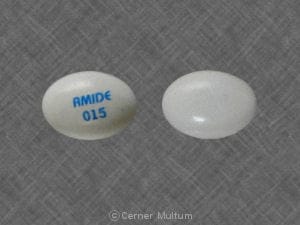What is dexchlorpheniramine used for?
- Dexchlorpheniramine is used to ease allergy signs.
Before taking dexchlorpheniramine, tell your doctor:
For all patients taking dexchlorpheniramine:
- If you are allergic to dexchlorpheniramine; any part of this medicine; or any other drugs, foods, or substances. Tell your doctor about the allergy and what signs you had.
- If you have asthma.
- If you have taken certain drugs for depression or Parkinson's disease in the last 14 days. This includes isocarboxazid, phenelzine, tranylcypromine, selegiline, or rasagiline. Very high blood pressure may happen.
- If you are breast-feeding. Do not breast-feed while you take dexchlorpheniramine.
Children:
- If your child is a premature baby or is a newborn. Do not give dexchlorpheniramine to a premature baby or a newborn.
This is not a list of all drugs or health problems that interact with dexchlorpheniramine.
Tell your doctor and pharmacist about all of your drugs (prescription or OTC, natural products, vitamins) and health problems. You must check to make sure that it is safe for you to take dexchlorpheniramine with all of your drugs and health problems. Do not start, stop, or change the dose of any drug without checking with your doctor.
What are some things I need to know or do while I take dexchlorpheniramine?
- Tell all of your health care providers that you take dexchlorpheniramine. This includes your doctors, nurses, pharmacists, and dentists.
- Do not take more than what your doctor told you to take. Taking more than you are told may raise your chance of very bad side effects.
- Do not use longer than you have been told by the doctor.
- Avoid driving and doing other tasks or actions that call for you to be alert until you see how dexchlorpheniramine affects you.
- Avoid drinking alcohol while taking dexchlorpheniramine.
- Talk with your doctor before you use other drugs and natural products that slow your actions.
- If you are 60 or older, use dexchlorpheniramine with care. You could have more side effects.
- Use with care in children. Talk with the doctor.
- Overdoses have happened with dexchlorpheniramine in children. Overdose of dexchlorpheniramine can cause very bad health problems and may lead to death. Talk with the doctor if you have questions.
- Tell your doctor if you are pregnant or plan on getting pregnant. You will need to talk about the benefits and risks of using dexchlorpheniramine while you are pregnant.
How is dexchlorpheniramine best taken?
Use dexchlorpheniramine as ordered by your doctor. Read all information given to you. Follow all instructions closely.
- Take with or without food. Take with food if it causes an upset stomach.
- Measure liquid doses carefully. Use the measuring device that comes with dexchlorpheniramine. If there is none, ask the pharmacist for a device to measure dexchlorpheniramine.
What do I do if I miss a dose?
- If you take dexchlorpheniramine on a regular basis, take a missed dose as soon as you think about it.
- If it is close to the time for your next dose, skip the missed dose and go back to your normal time.
- Do not take 2 doses at the same time or extra doses.
- Many times dexchlorpheniramine is taken on an as needed basis. Do not take more often than told by the doctor.
What are the side effects of dexchlorpheniramine that I need to call my doctor about immediately?
WARNING/CAUTION: Even though it may be rare, some people may have very bad and sometimes deadly side effects when taking a drug. Tell your doctor or get medical help right away if you have any of the following signs or symptoms that may be related to a very bad side effect:
- Signs of an allergic reaction, like rash; hives; itching; red, swollen, blistered, or peeling skin with or without fever; wheezing; tightness in the chest or throat; trouble breathing, swallowing, or talking; unusual hoarseness; or swelling of the mouth, face, lips, tongue, or throat.
- Not able to pass urine or change in how much urine is passed.
- Seizures.
- Shakiness.
- Very bad dizziness or passing out.
- Change in eyesight.
- Change in balance.
- Any unexplained bruising or bleeding.
- Feeling very tired or weak.
- Fever or chills.
- Sore throat.
- Feeling confused.
- A burning, numbness, or tingling feeling that is not normal.
- Ringing in ears.
- Sweating a lot.
What are some other side effects of dexchlorpheniramine?
All drugs may cause side effects. However, many people have no side effects or only have minor side effects. Call your doctor or get medical help if any of these side effects or any other side effects bother you or do not go away:
- Feeling sleepy.
- Dizziness.
- Diarrhea.
- Constipation.
- Dry mouth.
- Dry nose.
- Feeling nervous and excitable.
- Feeling irritable.
- Not hungry.
- Upset stomach or throwing up.
- Not able to sleep.
- Feeling tired or weak.
- Restlessness.
- Thickening of mucus in nose or throat.
These are not all of the side effects that may occur. If you have questions about side effects, call your doctor. Call your doctor for medical advice about side effects.
You may report side effects to the FDA at 1-800-332-1088. You may also report side effects at https://www.fda.gov/medwatch.
If overdose is suspected:
If you think there has been an overdose, call your poison control center or get medical care right away. Be ready to tell or show what was taken, how much, and when it happened.
Dexchlorpheniramine Images
How do I store and/or throw out dexchlorpheniramine?
- Store at room temperature.
- Protect from light.
- Store in a dry place. Do not store in a bathroom.
- Keep all drugs in a safe place. Keep all drugs out of the reach of children and pets.
- Throw away unused or expired drugs. Do not flush down a toilet or pour down a drain unless you are told to do so. Check with your pharmacist if you have questions about the best way to throw out drugs. There may be drug take-back programs in your area.
Consumer information use and disclaimer
- If your symptoms or health problems do not get better or if they become worse, call your doctor.
- Do not share your drugs with others and do not take anyone else's drugs.
- Some drugs may have another patient information leaflet. Check with your pharmacist. If you have any questions about dexchlorpheniramine, please talk with your doctor, nurse, pharmacist, or other health care provider.
- If you think there has been an overdose, call your poison control center or get medical care right away. Be ready to tell or show what was taken, how much, and when it happened.
This information should not be used to decide whether or not to take dexchlorpheniramine or any other medicine. Only the healthcare provider has the knowledge and training to decide which medicines are right for a specific patient. This information does not endorse any medicine as safe, effective, or approved for treating any patient or health condition. This is only a brief summary of general information about this medicine. It does NOT include all information about the possible uses, directions, warnings, precautions, interactions, adverse effects, or risks that may apply to dexchlorpheniramine. This information is not specific medical advice and does not replace information you receive from the healthcare provider. You must talk with the healthcare provider for complete information about the risks and benefits of using this medicine.





